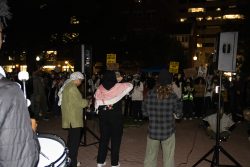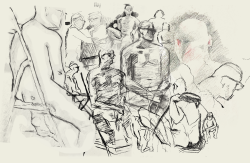Washington, D.C., is a hub for educated professionals from all over the world. From the high-end academic institutions in the city to the major decision makers on Capitol Hill, the District runs on the idea of always being informed. In a city that prides itself on knowledge and function, there is no better representation of this mantra than the local bookstores.
Every major chain bookstore in the District has closed, with the exception of various campus Barnes and Nobles. From 2008-2010, eBook sales increased by 1,260 percent after the emergence of the Amazon Kindle, while print book sales fell 9.3 percent between 2011 and 2012. As Borders folded at the end of 2010, other chains like Barnes and Noble responded to the competition by creating their own e-readers. It seemed that the traditional bookstore industry was on its way out.
While competition has decimated even the strongest chains, some smaller stores have managed to stay afoat. Some are even thriving, notably Kramerbooks and Politics and Prose, well-known independent bookstores which have each been part of the District’s landscape for over three decades.
Kramerbooks, founded in 1976 in DuPont Circle, has been a staple in Washington for 41 years. The trademark red neon sign in the front window draws eyes to its walls of books and Afterwords Cafe, a cozy restaurant that shares the property. Both businesses were part of the vision co-founders Bill Kramer, Henry Posner, and David Tenney shared when they set out to provide a full experience of eating and reading.
A new book on a unique subject lies within grasp in each direction you turn. New owner Steve Salis, co-founder of local chain &pizza, admires the store’s enchanting atmosphere. “We like that you can get lost in here,” said Salis in an interview with The Washington Post.
The tightly packed shelves, quiet music, and amicable staff provide an intimate experience for anyone who walks in.
“We don’t have the advantages of Barnes and Noble or Amazon,” said Lynn Schwartz, the general manager of Kramerbooks. “What we rely on is the type of environment that we can create here.”
While Kramerbooks is in the heart of DuPont Circle, Politics and Prose lies on the fringes of the city down Connecticut Avenue. Founded by the late Carla Cohen and Barbara Meade in 1984, the store quickly outgrew its location at 5010 Connecticut and expanded across the street in 1989. Today, announcements written on the front window of future events and drawings catch the eye of those who pass by.
Located out in the more spacious Forest Hills neighborhood, Politics and Prose is significantly larger than Kramerbooks. The muted natural light penetrates the heart of the store, making it a sanctuary for the reader, disconnected from the outside world.
Seats and tables are provided throughout the store for customers to relax and lose themselves in their books. In the back, owners Lissa Muscatine and Bradley Graham, two former reporters for The Washington Post, have a shelf lled with their favorites.
Among listening to various guest speakers at Politics and Prose, meeting a friend at the Afterwords Cafe for lunch, and even finding a random book title and freezing on the spot to read the back cover or first couple of pages, there’s no rush. The layout is thoughtful; the shelves do not harp on efficiency to the point of blandness. A trip to one of these stores is a journey to be taken, and there’s always something new inside.
Kramerbooks continues to add more variety for its customers and engage in its community as it evolves. The staff has also become more innovative, adding to the personality and experience of the store.
“We do more. We have author talks and events,” said Schwartz. “We’ve grown in trying to do a lot of new things and take a lot of chances.”
In contrast to the recent failures of larger competitors, these two indie bookstores have become integral to the Washington landscape by leaving their respective customers with fond and vivid memories. This formula has been a hallmark of D.C. culture for decades, and is being used effectively by younger members of the D.C. bookstore scene as well.
Busboys and Poets, a local bookstore and restaurant chain, has become a well-known D.C. landmark for tourists and locals alike since opening in 2005. For the past 12 years, it has advertised itself as “a community resource for artists, activists, writers, thinkers and dreamers,” celebrating historic literary figures like former D.C. busboy Langston Hughes. The stores run events for their communities, encouraging participation in discussions and art for those who feel so inclined.
Because a large part of their business relies on nostalgia, independent bookstores like Kramerbooks and Politics and Prose must often make a difficult decision between evolving and advancing their infrastructure and maintaining the familiar aura that their customers have come to expect.
Roy Barber, a D.C. resident since 1979 who frequents both bookstores, noted the substantial growth of Kramerbooks in recent years.
“I haven’t been to Kramer’s in a while, but it seems like it’s doubled in size,” he said. “It keeps getting bigger and bigger, which I guess is a good sign for an independent bookstore.”
Kramerbooks added 800 square feet in November after neighboring Willie T’s Lobster Shack relocated in 2016. The additional space, which is to the right of the main entrance, now holds the store’s nonfiction and biography sections, while the history, cooking, and children’s sections have also expanded since the acquisition. The new space also allows for a closer partnership with Afterwords.
One of Salis’ goals as a new owner is to establish a stronger connection between the two businesses. The cafe’s doors are on a different street than that of the bookstore, and from the restaurant’s front entrance, the bookstore behind is hidden. While the two are connected physically—there is a back entrance to the restaurant through the bookstore—not every customer goes to both.
The restaurant accommodates the bookstore’s schedule so that customers can enjoy a meal as they read at all times of the day. Both Kramerbooks and Afterwords Cafe are open from 7:30 a.m. to 1 a.m. on weekdays and until 3 a.m. on weekends, and the menu ranges from breakfast to dinner to late night specials. Customers will often drop in for a book, stay for a meal, and listlessly pass hours browsing the thousands of books and taking in the laid back atmosphere.
Both bookstores are well established in Washington, but their paths to this point have been very different. Kramerbooks, located in DuPont Circle, was able to build itself up through the foot traffic that passes its storefront every day. Kramerbooks holds events for authors to speak and share their work, but these occasions are neither as numerous, nor as famous, as those that take place at Politics and Prose.
Politics and Prose isn’t in a bustling area of the District but instead is located near the Maryland border, forcing it to be more creative in how it draws in its customers. In a March 2013 interview with the Washingtonian, Meade explains, “We’ve [Cohen and Meade] run it the way we have because we wanted it to become a literary and cultural center.”
The most visible aspect of it becoming a cultural center is the speaker series that the store offers.
“The speaker programs haven’t changed very much except they’ve gotten bigger and a little more varied than they were before,” said Barry Hillenbrand, former TIME correspondent and regular customer at Politics and Prose for 17 years.
The store’s website advertises events from authors Mike Lupica and John Green, singer Art Garfunkel, and, as the name suggests, countless political thinkers. Their enormous political section spans from travels through Russia, to American influence in East Asia, to refugees in the Middle East, to memoirs of growing up during World War II. Politics and Prose has long been a popular stop on highly publicized book tours for authors looking to promote their work. Now with Muscatine, a former Hillary Clinton speechwriter as well as a veteran of the Clinton White House, as an owner, the store can make an even stronger case to the political writers interested in speaking about their works.
“I love that I read The New York Times Book Review and next week two of the writers who are pro led are at Politics and Prose,” Barber said.
Showcasing the authors and their work is a point of pride for the store, and the authors seem to recognize this as they return to speak again.
“As an independent bookstore, the most important things are obviously the authors and the books themselves,” said Jon Purves, Director of Marketing and Publicity at Politics and Prose. “To have people of that caliber coming through, in and out, on a daily basis makes it an exciting place to work.”
But it’s not just a place for established authors to give speeches. The store also allows customers to fully experience the publishing process through the Opus self-publishing program, Purves said.
The service can be used by anyone who needs help printing their work. Purves explained that the store can help with layout, cover design, and even marketing the book in their store.
However, most customers visit for one thing: the books. The staff at both stores are enthusiastic about their books
and knowledgeable about what to recommend. This service is something that online shopping cannot replicate.
“If you’re not quite sure [what you want], then you can’t really beat the physical bookstore experience: coming in, browsing the shelves, seeing what’s on the display,” said Purves. “It’s more than just coming into a shop and buying something; it’s a whole community centered around reading.”
On May 1, The New York Daily News reported that digital book sales declined by 19 percent in the United States, while physical book sales rose eight percent for paperbacks, four percent for hardbacks, and 16 percent for children’s books.
To Hillenbrand, it’s not all that dissimilar to the movies business in the 1980s. “You’ve got DVDs; Nobody’s going to go to the movie theater anymore. You’re going to all watch it on television at home. Well, that hasn’t happened. People still want to go to movies.” For Hillebrand, the same thing is true of books and bookstores.
Especially now with the larger chains gone, it has fallen to the independent bookstores to carry the load. Kramerbooks and Politics and Prose have already made their mark in a combined 74 years in Washington.
“Maybe it appeals to an elitism or overeducation here, but good. I’m just thrilled that they’re alive.” said Barber. “One of the main reasons I would stay in Washington in retirement is because of these bookstores.”
The stores show no signs of slowing down. Both have new owners that are ready to adapt the stores as times change. Even in crowded DuPont Circle, Kramerbooks continues to grow, and Politics and Prose’s speaker series is still thriving.
Yet both stores have stayed rooted to their origins and the visions of their founders. Politics and Prose continues to be a hotbed of dialogue and discussion, while Kramerbooks still keeps its doors open late for customers to enjoy the literature, food, and conversation.
It’s easy to lose track of time in the stores and spend hours peering at books. Then again, for Kramerbooks and Politics and Prose, that’s kind of the point.





